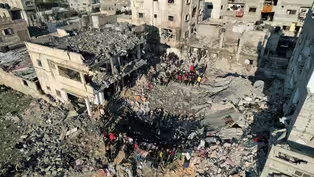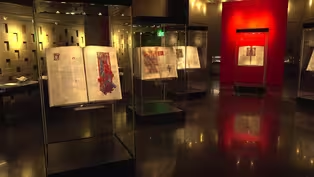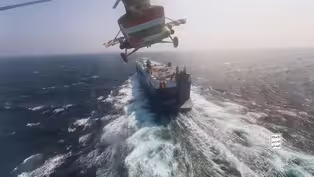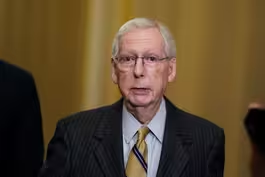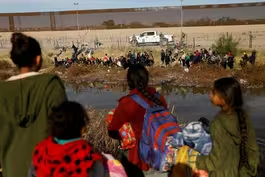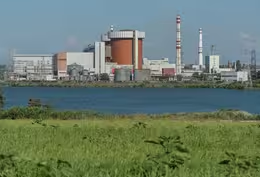
Iceland escapes worst-case scenario from volcanic eruption
Clip: 12/19/2023 | 4m 55sVideo has Closed Captions
Iceland escapes worst-case scenario as lava from volcano flows away from important areas
Iceland appears to have so far escaped the worst-case scenario after a volcano erupted overnight about 50 miles from the capital Reykjavik. The lava flow is moving away from important infrastructure, including a fishing port where 4,000 people had been moved waiting for just this moment. Special correspondent Malcolm Brabant reports.
Problems playing video? | Closed Captioning Feedback
Problems playing video? | Closed Captioning Feedback
Major corporate funding for the PBS News Hour is provided by BDO, BNSF, Consumer Cellular, American Cruise Lines, and Raymond James. Funding for the PBS NewsHour Weekend is provided by...

Iceland escapes worst-case scenario from volcanic eruption
Clip: 12/19/2023 | 4m 55sVideo has Closed Captions
Iceland appears to have so far escaped the worst-case scenario after a volcano erupted overnight about 50 miles from the capital Reykjavik. The lava flow is moving away from important infrastructure, including a fishing port where 4,000 people had been moved waiting for just this moment. Special correspondent Malcolm Brabant reports.
Problems playing video? | Closed Captioning Feedback
How to Watch PBS News Hour
PBS News Hour is available to stream on pbs.org and the free PBS App, available on iPhone, Apple TV, Android TV, Android smartphones, Amazon Fire TV, Amazon Fire Tablet, Roku, Samsung Smart TV, and Vizio.
Providing Support for PBS.org
Learn Moreabout PBS online sponsorshipGEOFF BENNETT: Iceland appears to have so far escaped the worst-case scenario after a volcano erupted overnight about 50 miles from the capital, Reykjavik.
The lava flow is moving away from important infrastructure, including a fishing port where 4,000 people had been moved waiting for just this moment.
Special correspondent Malcolm Brabant has the story.
MALCOLM BRABANT: After two months of intense earthquakes southwest of Iceland's capital, the volcano finally erupted.
This Webcam captured the moment, but not the roar of Mother Nature, as molten rock lit up the night sky.
Once the earth's crust had been breached, the lava flow quickly spread along three miles of fissures that had been formed by thousands of earthquakes.
As scientists had predicted and hoped, the eruptions took place north of a small fishing town called Grindavik, abandoned by its 4,000 residents in October, when the their homes were first threatened.
The Icelandic authorities dispatched a helicopter crew to assess the potential damage.
They were concerned that the rivers of lava might jeopardize a geothermal power station and the world-famous Blue Lagoon thermal baths.
On the ground, police officer Thorir Thorsteinsson was working to enforce the exclusion zone.
THORIR THORSTEINSSON, Grindavik, Iceland, Police Officer: We're clearing the town and the area, and now we're just securing the area and closing every road to the area.
Then we're just trying to manage the situation here.
MALCOLM BRABANT: Some thrill seekers managed to get close to the action, among them, American tourist Robert Forrester.
ROBERT FORRESTER, Tourist: I'm very excited to be here in this place.
And this is just fascinating to see just nature in action.
I just -- it's just like something from a movie.
MALCOLM BRABANT: But the first concerns of French tour guide Ael Kermarec were for the people worried about losing their homes.
AEL KERMAREC, Tour Guide: The town involved, which might end up under the under the lava that is flowing behind us, so, yes, that's kind of mixed feelings.
It's still amazing to see, but that's kind of a bittersweet feeling at the moment.
MALCOLM BRABANT: As night gave way to day, the eruptions above Grindavik had diminished by two-thirds.
RIKKE PEDERSEN, Iceland University: The location of this erupting fissure is optimal.
If we were absolutely to have an eruption within this volcanic system, it is quite favorable towards being as far from infrastructure as possible.
MALCOLM BRABANT: Rikke Pedersen leads the Nordic Volcanological Center at the University of Iceland.
So do you think this is it?
Is this as bad as it's going to get?
RIKKE PEDERSEN: Well, that is very difficult to say.
This is the typical behavior of a fissure eruption.
It starts quite vigorously, and it also often has an exponential decay.
But the extent, the duration of it, we can't say anything about.
It doesn't mean that it's over in two days.
It could be, but it can also continue with low effusion rates for weeks to months.
It's simply not possible to say.
MALCOLM BRABANT: What about the threat to the geothermal power station and also to the Blue Lagoon?
RIKKE PEDERSEN: So, both the Blue Lagoon and the geothermal power plant has now been fenced off with some big dikes.
So that's been constructed during these 40 days that we have had since the first dike was intruded.
MALCOLM BRABANT: Compared to other eruptions around the world, this is pretty small.
But I had a question for professor Dougal Jerram, a volcanologist at Oslo University.
Is this particular volcano likely to kick-start other ones within the chain in Iceland?
DOUGAL JERRAM, Oslo University: That's not necessarily the case.
One of the great things about Iceland is it's very well monitored.
And one of the reasons why we have been able to sort of focus in on this region, they have been able to successfully evacuate people and minimize all the risks associated with the eruption is because Iceland monitors the ground very, very well.
So they would be looking at a number of different places in Iceland where they have good seismic ground monitoring and also satellite data which monitors whether the ground is kind of expanding or contracting.
So any changes in the volcanic system, they should be able to pick up.
MALCOLM BRABANT: The people watching most keenly of all are the people of Grindavik.
They will be hoping that the volcano goes back to sleep, so they can return to their homes.
For the "PBS NewsHour," I'm Malcolm Brabant.
Area where Palestinians found shelter becomes battle zone
Video has Closed Captions
Clip: 12/19/2023 | 4m 50s | Area in Gaza where Israel told displaced Palestinians to seek shelter becomes battle zone (4m 50s)
Church leader hopes hand-written Bible can heal divides
Video has Closed Captions
Clip: 12/19/2023 | 7m 45s | Church leader hopes hand-written and illustrated Bible can heal religious divides (7m 45s)
How the media is covering Trump's anti-democratic rhetoric
Video has Closed Captions
Clip: 12/19/2023 | 10m 55s | How media organizations are facing the task of covering Trump's anti-democratic rhetoric (10m 55s)
How the U.S. plans to protect ships from attacks in Red Sea
Video has Closed Captions
Clip: 12/19/2023 | 4m 32s | How the U.S. and allies plan to protect ships from Houthi attacks in Red Sea (4m 32s)
News Wrap: Deal on Ukraine aid not expected before holidays
Video has Closed Captions
Clip: 12/19/2023 | 4m 22s | News Wrap: Senate deal on Ukraine aid, border security not expected before holiday break (4m 22s)
Texas legislator on law targeting illegal border crossings
Video has Closed Captions
Clip: 12/19/2023 | 7m 20s | Texas legislator defends new law allowing police to arrest migrants who entered illegally (7m 20s)
Ukraine prepares for Russian attacks on energy grid
Video has Closed Captions
Clip: 12/19/2023 | 6m 52s | Ukraine prepares for another round of Russia's winter attacks on energy grid (6m 52s)
Providing Support for PBS.org
Learn Moreabout PBS online sponsorship
- News and Public Affairs

FRONTLINE is investigative journalism that questions, explains and changes our world.

- News and Public Affairs

Amanpour and Company features conversations with leaders and decision makers.












Support for PBS provided by:
Major corporate funding for the PBS News Hour is provided by BDO, BNSF, Consumer Cellular, American Cruise Lines, and Raymond James. Funding for the PBS NewsHour Weekend is provided by...

